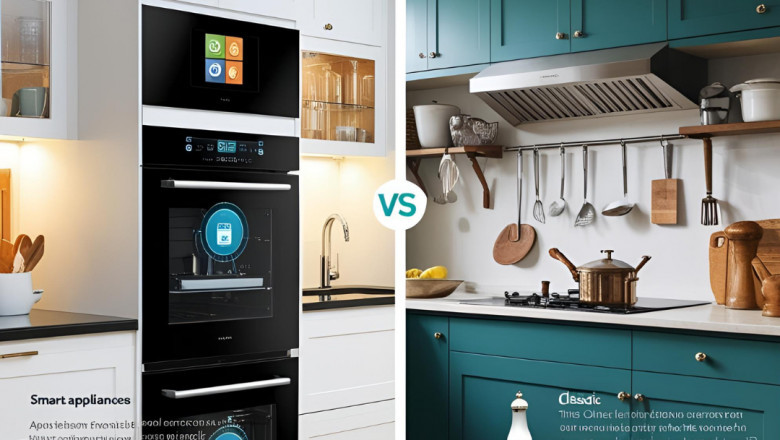views
Smart Appliances vs Traditional: Is It Worth the Upgrade?
In today's fast-paced world, the role of technology in our daily lives continues to grow—and nowhere is this more apparent than in the modern kitchen. From refrigerators that can help you shop to ovens you can control with your smartphone, smart appliances are becoming more common. But are they truly worth replacing your trusty traditional appliances? Let’s dive into the pros, cons, and key differences to help you decide.
What Are Smart Appliances?
Smart appliances are devices that connect to the internet or a home automation system, allowing you to control and monitor them remotely. These gadgets often come with advanced features like voice activation, energy monitoring, and personalized settings. For example, a smart fridge might suggest recipes based on its contents, while a smart dishwasher can start a cycle with a simple command through an app.
Traditional appliances, on the other hand, are the classic models many of us grew up with. They get the job done without the bells and whistles—no Wi-Fi, no apps, just straightforward performance.
Advantages of Smart Appliances
1. Convenience and Control
One of the biggest selling points of smart appliances is convenience. Imagine preheating your oven on your way home from work or getting a notification when your laundry is done. The ability to control appliances through your smartphone or voice assistants like Alexa and Google Home saves time and effort.
2. Energy Efficiency
Many smart appliances are designed to be more energy-efficient than their traditional counterparts. They can adjust usage based on your habits, schedule tasks during off-peak energy hours, and even alert you when maintenance is needed. Over time, this can translate into noticeable savings on your utility bills.
3. Advanced Features
Smart appliances often come loaded with innovative features. Refrigerators with interior cameras let you check their contents while shopping. Smart ovens can suggest optimal cooking settings for different dishes. These extras can make everyday tasks easier and even fun.
4. Remote Monitoring
With smart technology, you can monitor your appliances even when you’re not home. Whether it’s checking if you left the stove on or seeing how much time is left on a wash cycle, remote access adds an extra layer of peace of mind.
Drawbacks of Smart Appliances
1. High Initial Costs
The convenience of smart technology often comes at a premium. Smart appliances can cost significantly more than traditional models. If you’re upgrading your entire kitchen or laundry room, the expenses can quickly add up.
2. Complexity
While the advanced features are impressive, they can also complicate simple tasks. Some users find it frustrating to navigate apps or settings when all they want to do is turn on the oven or start a wash cycle.
3. Potential for Technical Issues
Like any connected device, smart appliances are susceptible to software glitches, connectivity issues, or hacking risks. Regular updates are required to keep them running smoothly, and repairs can sometimes be more expensive than with traditional models.
4. Shorter Lifespan?
There’s some debate about whether smart appliances have the same durability as traditional ones. Some consumers report that smart appliances, packed with electronics and software, may not last as long without issues compared to simpler, mechanical models.
How Do Small Appliances Fit In?
When thinking about the future of kitchens, small appliances like blenders, coffee makers, and toaster ovens are also evolving. Today’s smart versions offer features such as app-controlled brewing schedules or cooking presets that sync with your diet plans. While large smart appliances get most of the attention, innovation in small appliances is making it easier to bring smart technology into your kitchen without a huge upfront investment.
Smart coffee makers can brew your perfect cup just as your morning alarm goes off, while app-controlled slow cookers allow you to adjust temperatures while you’re still at the office. These examples show that you don't have to commit to a full kitchen overhaul to experience the benefits of smart technology.
Is It Worth Upgrading?
The decision between smart and traditional appliances ultimately comes down to your lifestyle, budget, and personal preferences.
If you love the idea of integrating technology into every corner of your home, enjoy convenience, and are willing to invest upfront for long-term energy savings and functionality, then upgrading to smart appliances makes a lot of sense. They offer exciting features that can streamline your daily routine and even make tasks like cooking and cleaning more enjoyable.
However, if you prefer simplicity, reliability, and a lower price point, traditional appliances still have a lot to offer. They’re generally easier to use, less prone to technical issues, and more affordable—both at the time of purchase and potentially throughout their lifespan.
You might also consider a hybrid approach: upgrade selectively. Start with small appliances to test how much you actually use and enjoy smart features before committing to larger investments like a smart refrigerator or oven.
Conclusion
In the end, there's no one-size-fits-all answer. Smart appliances offer undeniable benefits but come with costs and risks that aren’t ideal for everyone. By carefully evaluating your needs and testing the waters with smaller investments, you can find the right balance between innovation and practicality for your home.
Whether you go fully smart or stick with the classics, one thing is certain: the future of kitchen and home appliances is smarter than ever before.






















Comments
0 comment